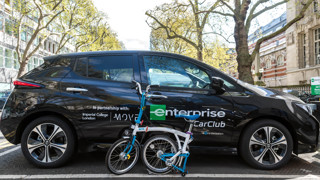Parking spaces in new housing developments should be limited to a maximum of one per property, says shared transport charity, Collaborative Mobility UK (CoMoUK).
The body is recommending limiting average car parking provision to one private car per dwelling or less and calls for planning policy to be redefined to centre on 'people and place', rather than cars, to encourage the use of shared services such as car clubs and bike hire.
In a new guide, CoMoUK says that hubs for active and shared modes of transport, as well as public transport, should be located closer to people’s front doors to make them more convenient.
Richard Dilks, chief executive of CoMoUK, said: “The UK Government’s commitments to reduce emissions shows the need to move to decarbonising options like shared transport.
“This behavioural change can be achieved through spatial planning design which encourages a shift away from low occupancy private car use.
“New developments are continuing to be designed and built that do not properly consider the important role shared transport can play in delivering sustainability.
“Our study shows that making shared transport and active travel more convenient than car use will reduce people’s dependency on private vehicles.”
The guide states that one car per dwelling or less was required for car sharing to be feasible.
A recommendation in the report says: “Limit average car parking provision to one private car per dwelling or less.
“The lower the ratios the greater the chance of breaking dependency on the private car and supporting the switch to sustainable modes.”
Employees that have access to a mobility hub at work are more likely to use active and shared travel options more often for commuting and business travel.
CoMoUK said planning policy should be revised to ensure it centres on shared transport and delivers access to amenities such as shops and healthcare via sustainable transport modes or in walking distance.
It says this approach should be formalised through supplementary planning guidance.























Login to comment
Comments
No comments have been made yet.